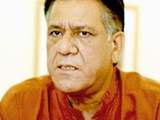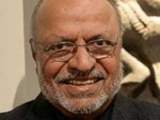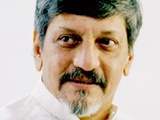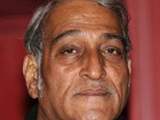Acclaimed playwright Vijay Tendulkar cremated (Second Lead)
Pune, May 19 (IANS) Vijay Dhondopant Tendulkar, one of the greatest Indian playwrights of the post-Independence era, was cremated here Monday a few hours after his death following prolonged illness. He was 80 years old.
Published: Monday,May 19, 2008 13:44 PM GMT-06:00
Pune, May 19 (IANS) Vijay Dhondopant Tendulkar, one of the greatest Indian playwrights of the post-Independence era, was cremated here Monday a few hours after his death following prolonged illness. He was 80 years old.
Tendulkar had been suffering from diabetes and myaesthena gravis, a disease affecting the muscles. He was undergoing treatment at the Prayag Hospital here. He died at 8 a.m.
Shirish Prayag, a doctor at the hospital, said: 'Tendulkar had been suffering from myaesthena gravis for the last one and a half years. He was first admitted in November last year and discharged in December. He fell ill again in April this year. He was readmitted but his condition did not improve.'
Tendulkar's funeral was held at about 11 a.m. at the Vaikunth crematorium here. It was attended by his family and friends, including actor and director Amol Palekar.
Tendulkar's friend Ashok Kulkarani said: 'A quick funeral was held. All his family and friends were present to bid him farewell.'
His son Raja and wife Nirmala both died in 2001. His daughter, actress Priya Tendulkar, died in 2002.
A Padma Bhushan awardee, Tendulkar was best known for his plays 'Ghashiram Kotwal' and 'Sakharam Binder'. He was awarded the Sangeet Natak Akademi Award and honoured with the Sangeet Natak Akademi Fellowship for lifetime achievement. In 1977, Tendulkar won the National Film Award for his screenplay of Shyam Benegal's movie 'Manthan'.
Palekar told IANS: 'The world of Marathi cinema is going to miss him a lot. He will be remembered for his work.'
Tendulkar was born in Kolhapur in Maharashtra on Jan 6, 1928, in a Saraswat Brahmin family. His father managed a small publishing business. The literary environment at home kindled a literary interest in him and he penned his first story at the age of six. By the time he turned 11, he had written, directed and acted in his first play.
In 1942, 14-year-old Tendulkar took part in the freedom struggle. He continued writing, more as a hobby than a profession.
Later, he began penning articles for newspapers, and some plays, but those did not receive much recognition. It was only in 1956 when he wrote "Shrimant" (Affluent) that he was catapulted into the league of recognised writers.
"Shrimant' told the story of a young unmarried woman who decides to keep her illegitimate child while her affluent father attempts to 'buy' a husband for her to preserve the family's reputation.
Shifting to Mumbai in the mid-1950s meant an intense struggle for survival. Tendulkar was compelled to live in chawls where he got a first-hand experience of life in an urban lower middle class milieu.
In his early plays, he managed to effectively weave into the plots the authenticity of his life experiences into the characters and situations.
His involvement with fledgling theatre groups like "Rangayan" and young actors like Shreeram Lagoo, Mohan Agashe, Sulabha Deshpande, and later Naseeruddin Shah, Amol Palekar, Om Puri, Smita Patil, Girish Karnad, Jabbar Patel, and others helped bring his stories, drama and plays to the masses.
His daughter Priya joined him in his endeavours, but also managed to chart her own independent career with a few movies and her much-acclaimed crusading tele-serial "Rajani'.
In 1967, he penned a play, "Shantata! Court Chalu Aahe!" (Silence! The Court is in Session!), based on a short story "Traps" by Friedrich Durrenmatt, which was later made into a movie scripted by Tendulkar. The play was translated into various Indian languages and performed to packed houses all over the country for many years.
It was his 1961 play, "Giddhade" (Vultures), which was produced and staged after nine years, that helped Tendulkar carve his own niche in the world of Marathi literature.
Later, he wrote memorable plays like "Sakharam Binder" (1971), dealing with the issue of male chauvinism, and "Ghashiram Kotwal" (1972), dealing with political violence set in the 18th century era of Maratha reign.
'Ghashiram Kotwal' was staged over 6,000 times in its original and adapted versions, making it one of the longest running plays in Indian theatre history.
Tendulkar started a parallel innings with the world of cinema. He wrote screenplays for eight Marathi movies, including "Saamana" (Confrontation - 1975), "Simhaasan" (Throne - 1979) "Umbartha" (The Threshold - 1981) and "Mitrachi Gosht" (Friend's Story).
For Hindi movies, Tendulkar wrote the screenplays for some of the most socially relevant movies - "Nishant" (1974), "Aakrosh" (1980), "Ardh Satya" (1984), and "Kamala'.
His rich literary contribution includes 27 full-length plays, 25 one-act plays, many of them considered classics in Marathi literature and translated and performed in various languages.
Apart from translating a dozen novels and five plays by other authors into Marathi, Tendulkar penned a biography, 16 plays for children and five anthologies of short stories.
Last year, a biographical documentary chronicling his life and times, "Tendulkar ani himsa: Aaj ani kal" (Tendulkar and Violence: Today and Yesterday) and a short film on him, "Ankahin" (The Untold) were released.
ALSO READ: IC 814: Pooja Gor shares her heartfelt reaction after receiving praise from Naseeruddin Shah
Your reaction
 Nice
Nice Awesome
Awesome Loved
Loved LOL
LOL OMG
OMG Cry
Cry Fail
Fail
























Comments (0)